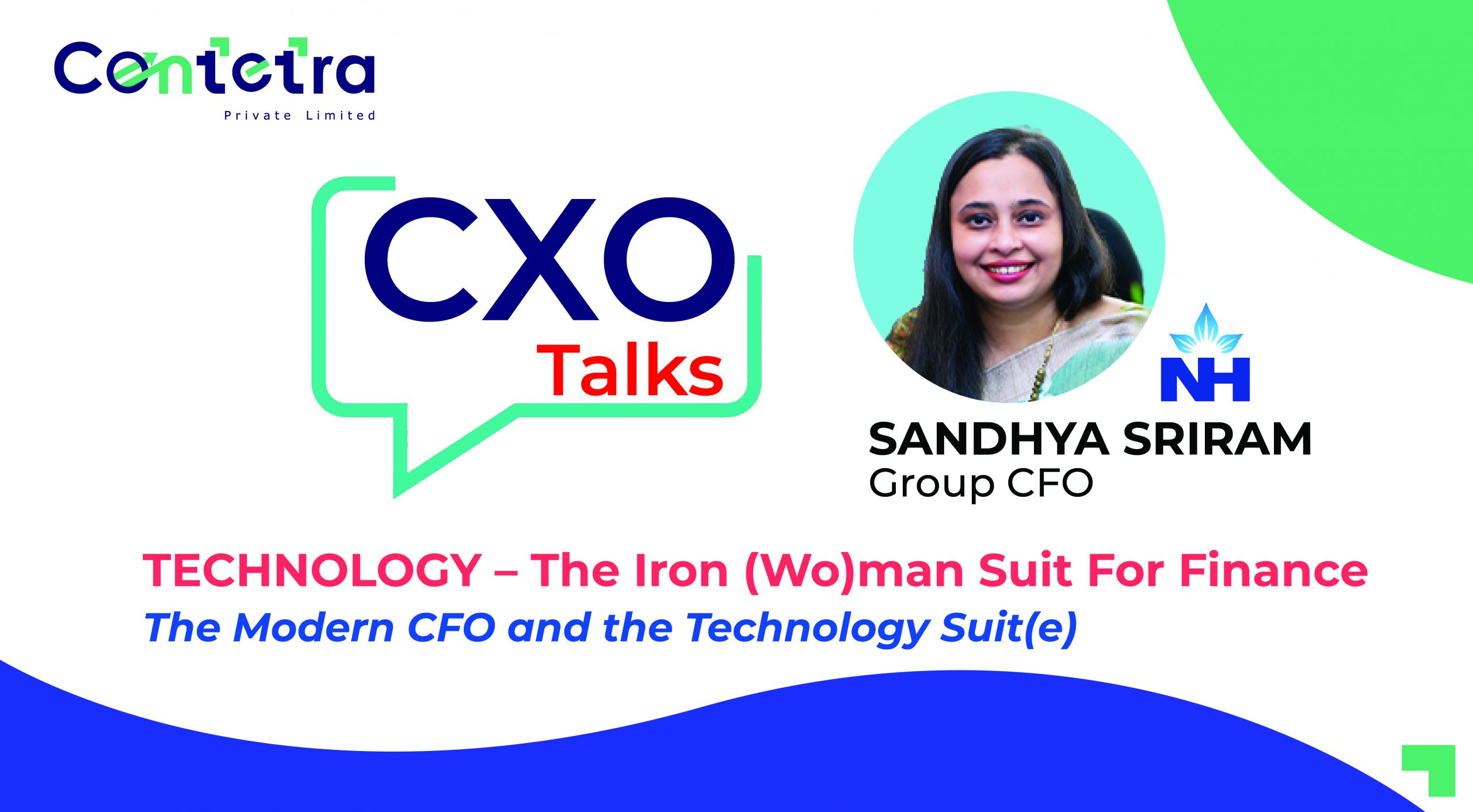Welcome to our new series of CXO talks by Contetra. This series will feature C-suite executives from rapidly developing organizations all over the world discussing their views on industry trends and challenges.
Sandhya Sriram is the Group CFO of Narayana health. She has a been finance controller for a decade now, in different multinational companies such as HUL & Wipro. She has been a featured star since her graduation & was recently awarded as the Most Innovative CFO. She was also featured in Asia’s Top 100 Power Leaders in finance. Along with that, she is an excellent speaker and writer. Her skills and thoughts routinely bedazzle the whole finance community.
Over to Sandhya now, for her say on “The Modern CFO and the Technology Suit(e)”
“Technology is the new buzz word for all CFOs. Everyone is talking about digital disruption, about automation, RPAs, Block chain, Artificial Intelligence. But, when we get down to brass tacks, many are still battling with how big the task is, where do they start and how do they show value to business. Finance in most organizations are early adopters and ambassadors of technology!
In the 90s and early 00’s, Finance teams pioneered ERP adoption which enabled connecting various parts of an enterprise with each other in a seamless way. This helped organizations grow and scale. One may say, among other things like economy opening and access to capital, strong ERPs managing the transactional backbones have helped organizations with agility to grow – the Industrial Age for technology so to speak, where various nodes of the organization learnt to talk to each other through machines. While the phase of ERPs was cementing itself, pioneered by some visionary thinking by companies like GE, shared services found its way into bringing speed, simplicity and controls in growing organizations. We may as well call this the Information Age!
Through the Industrial and Information Age, CFOs were firmly placed at the front and center of the technological journey of organizations. They were able to work with the business, build solutions, measure outcomes, deliver meaningful business cases and create value. The transition was slow, giving time for people to learn, grow and settle into the new world.
The Evolution of the Social Age
In the past decade, however, CFOs have been pushed into a very different world. From a place where technology brought order, the social world looks to leverage the power of chaos. It is not about creating monolithic solutions and pushing them to interact with customers but working with fluid designs and feedback. For the same consumer outcomes, some organizations are expected to look at cash flows and profits while others competing for the same share of spends with deep pockets are driven solely by the valuation game. For the CFO, this has been akin to finding themselves in the driver’s seat of a driverless car with a mind of its own! The life cycle of a technology adoption journey which was typically 4-5 years in the past is suddenly less than a year, even a few months in some cases. The possible combinations or paths to take to take have also multiplied. The solutions are multi-dimensional. And the baggage of the centralized designs built in the past are slowing down organizations and CFOs are left with having to make choices on how much to let go.
The evolution journey is indeed BANI – Brittle, Anxious, Non-Linear and Incomprehensible. One thing is for sure. Evolution is the only choice. Technology which was probably played the role of wheels to business processes are now becoming like Iron (Wo)Man suits. It is the differentiator between Mediocre and Extra-ordinary outcomes.
However, the answer to this does not lie in filling the organization with fancy tools and gadgets, and neither in being able to spout buzz words in transformation conferences. It is not in hiding behind a cloak of invincibility and telling the world that we have arrived, but by accepting that we are vulnerable, accepting we can learn and evolve from each other, taking small significant steps and moving the needle.
Learning to evolve in this social world, CFOs have to start thinking about the customer front, back and center. If the customer has to spend 1 extra minute making a payment than what is required, instead of looking at it from a lens of what more one step can achieve in terms of reducing organisation load, CFOs have to see if they can give that one minute back to the customer.
Organisational processes have to be ruthlessly simplified. This is more difficult that one envisages, since simplification often leads to lack of control It is not about what the leadership or the CFOs want. It is about auditors, board members and stake holders being comfortable in operating with a certain level of tolerance. For example, in the case of employee reimbursements, many organizations are still expected to dot all the ‘I’s and cross all the ’T’s before payments are made. A single instance of fraud or wrong payment is met with a knee jerk reaction to improve the controls and add more steps to the already complicated process charts. We must look at materiality vs convenience and not aspire for absolute controls, while also inculcating the culture of trust in ecosystem. There is a long journey to change the environment which thinks otherwise, especially for those working with large scale control mature organizations
To be relevant in the social age, it is important for CFOs to release bandwidth for spending and understanding the business better. CFOs still prefer to be the custodians of reporting and analytics. Information democratization using BI tools is an important aspect of the journey but that is only a small part. Adoption requires the organisation to adapt and the CFO has to drive this from the front.
It is also important that the distinction between Vanity and reality is drawn by the CFOs. Some of them tend to be over conservative and scuttle technologies that they don’t make straight forward business cases. At the other end, some of them, just get off the technology bus and leave it to the business teams to steer and commit into vanity projects which waste organizational resources. Getting on the driver seat and being able to participate in choices require a different level of participation and understanding of the business realities. It also requires one to accept that there is a common goal that is being achieved and a relationship of mutual trust and respect is built with business stake holders.
Finally, the CFO must look inside and deeply understand and correct skill gaps within their team. Skill gaps are not knowledge of technologies, those gaps can be fixed. The difficult ones are soft skills which are needed to create value in today’s world: bias for action, agility, balance between speed and process, business intimacy, and culture building. Many times, these skills are heavily underrated until the CFO is stuck with a senior finance team who cannot work at the pace and wavelength as him(her)self. This is one of the most significant challenges that a CFO may have to overcome to create a technology savvy team.
In Summary, it is yet another journey of evolution for the finance community. With the right mindset, approach and agility, surely finance can surely act as a co-pilot and steer business outcomes with confidence and power. “
We thank Sandhya for sharing such an insightful article with us!
Follow the author on LinkedIn here
At Contetra we work with CFOs and senior finance leaders across the world by helping them get the competitive advantage they need – whether it’s creating financial statements that make more sense for a global world, or finance transformation initiatives that drives their business to new heights.
We hope you found this to be an insightful read. Follow our CEO and CFO on LinkedIn for more content about #internationalGAAP #IFRS #BusinessFinance #FPA #FinanceStrategy #ERPImplementation and more!















Very insightful article. Also fascinating food for thought – why is it that Finance is always the adopter of technology/ERP in an org? Is it because we are always chasing ROI? 🙂 🙂
Hi contetra.com administrator, Keep up the good work, admin!
Hi contetra.com admin, You always provide great examples and real-world applications.
Hi contetra.com admin, Thanks for the well-organized and comprehensive post!